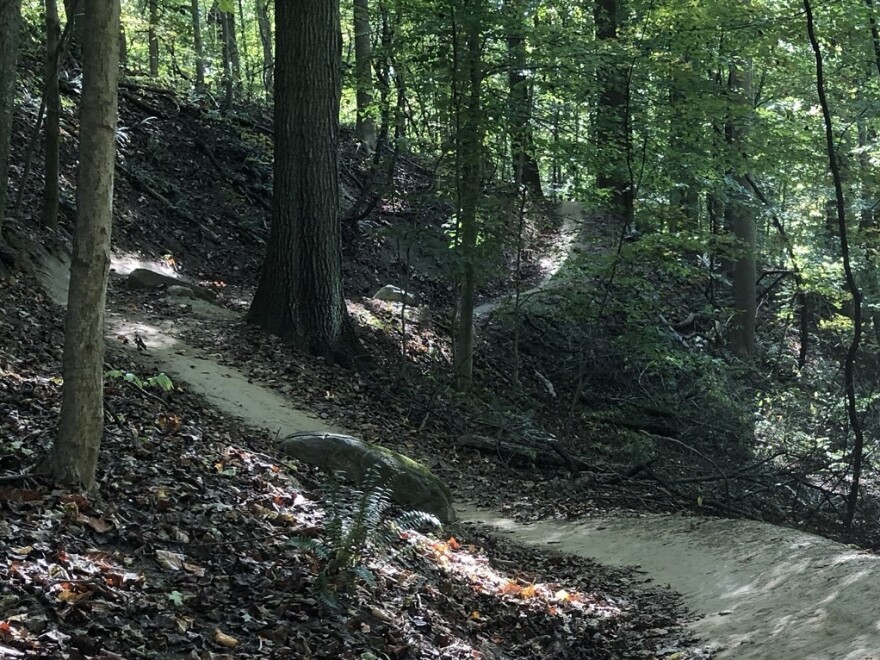Electric assisted bicycles, or e-bikes, are becoming more and more popular across the United States. Throughout the country's national parks, that could be a good and a bad thing.
It can be tough to distinguish an e-bike from a regular road or mountain bike by sight, but once you start pedaling, you sure feel the difference.
Battery-powered electric motors make pedaling much easier, uphill or down. Depending on the class of e-bike, the motors can give riders a boost of up to 28 miles per hour.
This year, the Interior Department directed all its bureaus, including the National Park Service, to adopt a policy for e-bikes.
Natalie Levine, with the National Parks Conservation Association, said that directive left parks about a month to scramble and adopt their own rules about where e-bikes are allowed.
"There are many parks where traditional bicycles are currently only allowed on park roads. So in those situations, adding electric bicycles there might not be as a big of a concern," Levine said.
But some parks, such as Golden Gate National Recreation Area and Acadia National Park, have more sensitive unpaved roads open to cyclists.
"We think there should be more analysis of the impacts of these bicycles," Levine said.
In Ohio's Cuyahoga Valley National Park, which sits between Cleveland and Akron, there are miles of dedicated mountain bike trails.
Stephen Metzler, head of the Cleveland Area Mountain Bike Association, said the park's carefully built trails weren't created with heavier and potentially faster e-bikes in mind.

"Speeds on the downhill, with a heavier bike, it could potentially cause injury to the rider and other trail users," Metzler said.
Cuyahoga Valley rolled out a draft policy allowing e-bikes on its roads and multi-use paths, but it banned them outright on the mountain bike trails.
"We, at this time, don't have enough data to be able to answer the question, 'Is an e-mountain bike different than a traditional mountain bike?' as far as impact on the trail or on resources," said Pamela Barnes, public information officer for Cuyahoga Valley National Park.
Ban or no ban, mountain biker Cody Rider said e-mountain bikes are already on the trails in Cuyahoga Valley anyway.
"I think it's a lot like cars. Anybody can go buy a car, and anybody can go the speed limit. And then you can also drive considerably over the speed limit and make it an unpleasant experience for everyone around you and unsafe for that matter too," Rider said.
Proponents of e-bikes say the addition of pedal assist allows users of different abilities to ride mountain bike trails.
"It's just like riding a bike with less effort. I don't know how that's destroying any trails," e-mountain biker Matt Lewis said.
"This will get you back out there and get you doing the things you haven't done in a long time just because it's a lot easier," Lewis said.

Cleveland-area bike shop owner Chad Marn has no problem with people of any ability using e-bikes in national parks, but he's against allowing them on mountain bike trails that can be challenging for novice riders.
"If someone lacks the physical prowess or skill set to handle that, providing them an engine doesn't necessarily change those facts," Marn said.
Pete Smakula, who owns an e-bike store in Akron, disagrees.
"People who have different abilities will still look at a section of trail and go, 'Yeah, I can do that' or 'I can't,' " Smakula said.
With manufacturers racing to put out more and more e-bike models, Marn recognizes that he could be fighting a losing battle.
"I've actually asked the opinion of a lot of the different bicycle people that I trust, and the resounding theme is, 'It's inevitable — quit fighting it,' " Marn said.
And it's that popularity that's pressuring national parks to figure out whether to welcome or to restrict them.
Copyright 2019 WKSU


